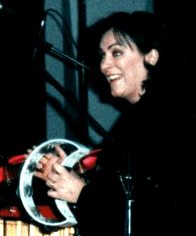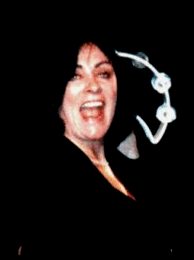 Dublin's Mary Black talked to Marcus Metz in Mainz (Germany) on the 19th of April 2000 – she had released her new album "Speaking with the Angel" and prepared a small Germany tour in May.
Dublin's Mary Black talked to Marcus Metz in Mainz (Germany) on the 19th of April 2000 – she had released her new album "Speaking with the Angel" and prepared a small Germany tour in May.
 Dublin's Mary Black talked to Marcus Metz in Mainz (Germany) on the 19th of April 2000 – she had released her new album "Speaking with the Angel" and prepared a small Germany tour in May.
Dublin's Mary Black talked to Marcus Metz in Mainz (Germany) on the 19th of April 2000 – she had released her new album "Speaking with the Angel" and prepared a small Germany tour in May.
Marcus Metz: When did you first come to Germany to do a gig?
Mary Black: It was 1977 with a group called "General Humbert" and we did a tour of festivals in the summertime, kind of folk festivals, around Germany. We spent
a lot of time here, nearly six weeks. I mean we were not working all the time, it was every day we were gigging, but it was great experience. I was very young and it
was very exciting for.
Marcus Metz: If you tour Gemany, is there any difference to Ireland?
Mary Black: I don't like to say there are differences. I see differences from city to city, you know. In Ireland the audiences are fairly animated, Dublin is crazy,
Belfast is pretty mad as well. But then you could go to a place like Limerick and while they are appreciative they are not quite the same. I'd like to say the same
about Germany or America. I pick out certain cities that are much more animated for me and more verbal so you get something back from them which I really like.
Marcus Metz: Do you think the type of audience has changed since you came here in 1977?
Mary Black: Coming here for the festivals was a bit different to coming here on my own as a solo performer. I've alway find German audiences very enthusiastic and
very knowledgable about Irish music, about what I do, but also generally about Irish music. They seem to have an affinity with Irish music. They seem to feel
something and get very emotional when they hear it. I don't understand it. People have asked me do I know why. And I don't really know why. But it's definitely
there.
Marcus Metz: Do you see yourself as a musical ambassador of Ireland if you are touring Germany?
Mary Black: No. I don't think like that. I never really think in terms of representing my country in any way. I represent myself. I am very much Irish and have been
very much influenced by everything Irish and I am very proud of being Irish. I think that comes across very much in my concerts. But don't think in terms of
representing my country. I think that's a big role to play (laughs).
Marcus Metz: Where do you get your songs from?
Mary Black: They come for me from very different sources. Over the years I've build up very strong relationships with a lot of Irish songwriters, people like
JiMarcusy McCarthy, Noel Brazil who is my favourite Irish songwriter, Mick Hanly, Steve Cooney who has written two songs and this album although he's an
adopted Irishman, and then people send me songs. Being the singer of other people's songs I get – I'm not exaggerating - thousands of tapes and CD every year
Thousands! So I have to get someone to go through them for me and then vet them a little bit. Because I could not go through them all. I would't have time to go for
walks with my kids or relax.
 Marcus Metz: Have you got a favourite song?
Marcus Metz: Have you got a favourite song?
Mary Black: When anybody asks me about my favourite song the first song that comes into my head is "Ellis Island". It's a song I rarely leave out of a set. I get very
emotional when I sing it, particularly being away from Ireland for a while. It's a song about emigration written by Noel Brazil. It's about emigration at a time when
people left and knew that they'd never get back to their homeland again. It's not necessary about Ireland, it could have been coming from Germany or anywhere, but
it's about two people saying goodbye for the last time. And that's what it was like. Not up to twenty years ago there was an element finality about people who
emigrated to America or Australia. That must have been very hard.
Marcus Metz: Have you got a main topic?
Mary Black: No. A song will touch me in a particular way and move me. It's hard to put a finger on what that is. It could about anything. I mean a lot of the songs
could be about love, usually about an unrequited love or broken relationships. Songwriters or people generally are usually are most vulnerable and most creative
when they are suffering. I think a lot of the best songs in the world have come from hardship or suffering. Certainly creativity comes out of hardship and pain. But
then again I've chosen some songs no this album like "Don't say O.K." which is about apathy, about people who sit around and maybe complain about stuff but don't
get up and do anything. It's about getting up and making changes and making your voice heard. There's "Message of Love" which I feel should be called "Millenium
Message of Love" written by Steve Cooney. It don't think there is any aspect of life that he has left out in that song if you listen to the lyrics. It's about looking after
this world and making it a better place for future generations, about giving up fighting and just getting down to what's really important.
Marcus Metz: What are the Irish artists you like most?
Mary Black: I like "Altan" as a band. We are friends as well. I saw them live recently and they are fantastic. They are getting better all the time. They are really
fantastic. It's amazing to see how they can keep improving, they got so tight. It's such an exciting band. Van Morrison – a have soft spot of all he has done, I mean
he's just somebody who I admire greatly and he has lasted the pace as well.
 Marcus Metz: How do you see the situation of the Irish music today, perhaps in comparison to the early eighties?
Marcus Metz: How do you see the situation of the Irish music today, perhaps in comparison to the early eighties?
Mary Black: I think there are changes. I mean the eighties... actually there was a kind of a drought musically. There were the few band around, "Altan", DeDanann"
and myself although I'm not strictly traditional, Christy was around. Today I know there are a lot of young people playing traditional Irish music 'cause my own
children are hanging out. My own nephew is playing bouzouki and he's playing with pipers and different traditional musicians. They are all Irish-speaking and the
seem to be very aware of their culture and the background. I really love that. I doesn't have to be a success as long as it's living. There has been a few new bands
coming through and there has been a lot of successful bands but not necessarily in traditional folk.
Marcus Metz: Do you think there is a change of an attitude that was to the Irish music and the Irish language?
Mary Black: I think there a feeling of overkill. All these different shows like "Riverdance", "Lord of the Dance", "Feet of the Dance" ... em... "Feet of Flames", you
know, there's about eight or nine of them out there. I think after a while people are looking for something else. I mean the likes of "Riverdance" is an amazing show
and I think the music in incredible, but after a while people are looking for something else, they want to discover something else. The Irish traditional thing has been
discovered and exposed and now they want to go somewhere else. They are looking at Cuban music now, maybe Salsa and different kinds African ethnic music.
Every thing has a cycle, you know. That's not to say it'll die but maybe go back to where it was twenty years ago. And it always was popular in Germany, I know
that from the seventies, 'cause I could see it then and it was amazing, And it has remained so. There has definitely happened something in Germany that you could
compare to the rest of the world.
Marcus Metz: Are the young people more aware of the Irish culture nowadays?
Mary Black: Definitely! I see that in the next generation. They have an enthusiasm and a love for it that we never had. I mean a was born and raised in Dublin. I
learned school Irish and a hated it because it was pressure. If you did't pass it in your exam you failed your whole exam, your whole leaving certificate. People didn't
teach it in a loving way or in a way that made it interesting. It was almost violent the way they taught. So you ended up hating it. And that's not the way you should
learn about your language and your culture. So I think that's definitely changed. Now there is a pride, a willingness and a love of their language and their culture. I
think that's going to reap the rewards in the future.
Latest published CD: Speaking with an Angel (Grapevine)
Further infos/contact: www.mary-black.com.
Photo Credit: (1) press photo, (2, 3) by Marcus Metz
Back to the content of FolkWorld Articles, Live Reviews & Columns
To the content of FolkWorld online magazine Nr. 16
All material published in FolkWorld is © The Author via FolkWorld. Storage for private use is allowed and welcome. Reviews and extracts of up to 200 words may be freely quoted and reproduced, if source and author are acknowledged. For any other reproduction please ask the Editors for permission.
